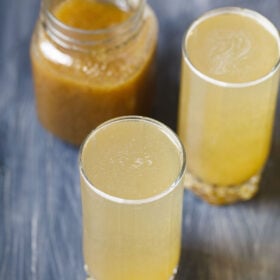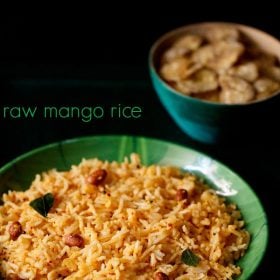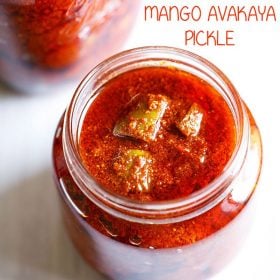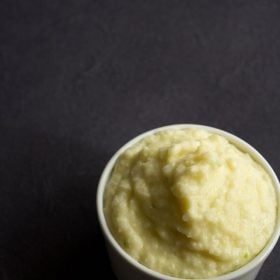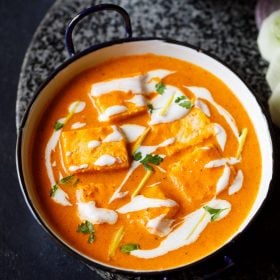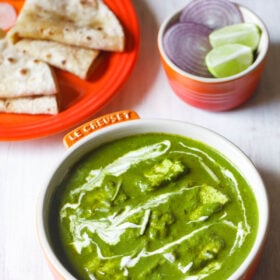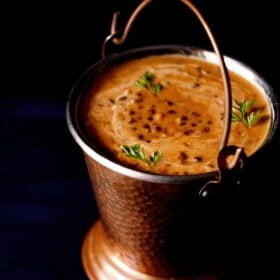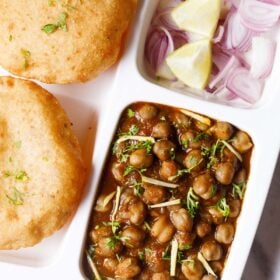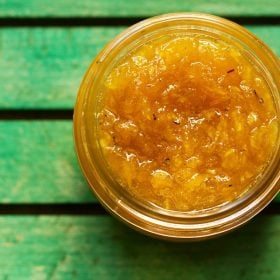Aam Ka Murabba or Mango Murabba is simply a sweet and tangy, fragrant raw mango preserve. You could also term it as an Indian jam or preserve. This is one of the ways that you can preserve the green ‘king of fruits,’ and enjoy it even after the season is over. The flavor of cardamom and saffron in this murabba make it even more delicious. It is vegan and gluten-free as well.
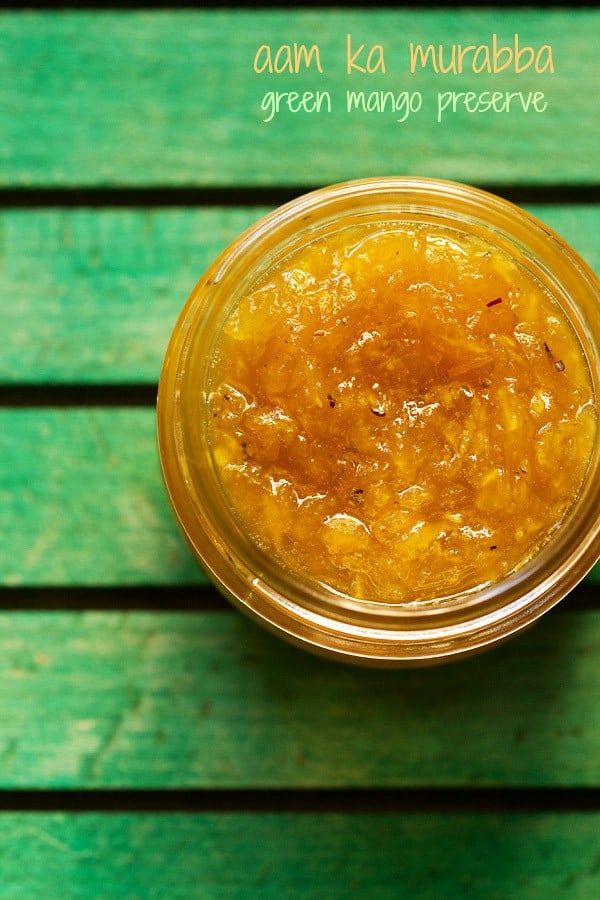
Table of Contents
What is a Murabba
Primarily an Arabic word, ‘murabba’ is nothing but a sweet preserve made with berries or fruits, spices and sugar.
It can also be categorized under candied fruits and is a popular way of preservation in the Middle East, Central Asia, South Asia and South Caucasus.
Murabba, also known to possess medicinal properties, can be prepared both in a dry and wet way. Thus, in India, it is believed to have a variety of uses as folk and traditional medicine.
Some of the fruits that can be turned into a murabba include Indian gooseberry (amla), mango (like this Mango Murabba), winter melon, apple, plum, apricot and quince.
About Mango Murabba
I have no shame in calling myself a mango maniac, and I feel sad for all those people who are unable to savor this gorgeous fruit due to some or the other reason. They are really missing out on a luscious, sweet natural gift from Mother Nature.
So, all for my love for mangoes, this is one more recipe that is close to my heart. This Aam Ka Murabba is a traditional North Indian preparation made with unripe sour green mangoes.
Apart from the fruit, there is just one more ingredient that goes in the recipe, that is sugar. Both these are cooked till a jamish consistency is achieved and you get a finger-licking sweet and sour preparation. Flavorings include cardamom and saffron.
Here’s a suggestion: Make a small batch of murabba as grating a lot of mangoes could be a tiring and tedious task.
You get about 450 grams of Aam Ka Murabba from 2 large mangoes. Store the murabba at room temperature or in the refrigerator. To make more, doubling the recipe is good.
Aam Ka Murabba is a super condiment with Chapati, Thepla, Aloo Paratha, Khichdi, Dal Fry with steamed rice or any comforting North Indian meal. You can also savor the deliciousness of this preserve as a dessert after your meals.
How to make Aam Ka Murabba
Prepare Mangoes
1. Rinse and wipe dry the raw unripe mangoes. Then, peel them.
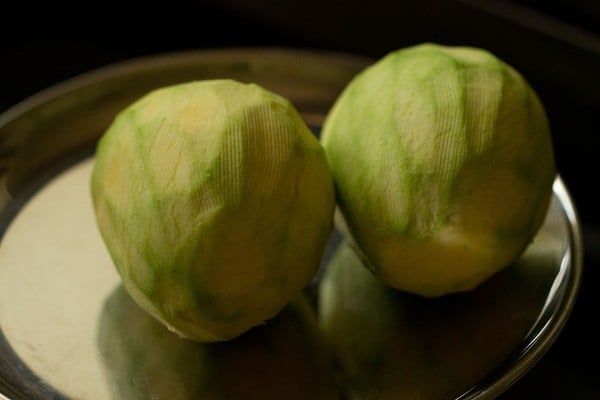
2. Grate or shred the mangoes. I used 2 large raw mangoes and got about 1.25 tightly packed cups of shredded mangoes.
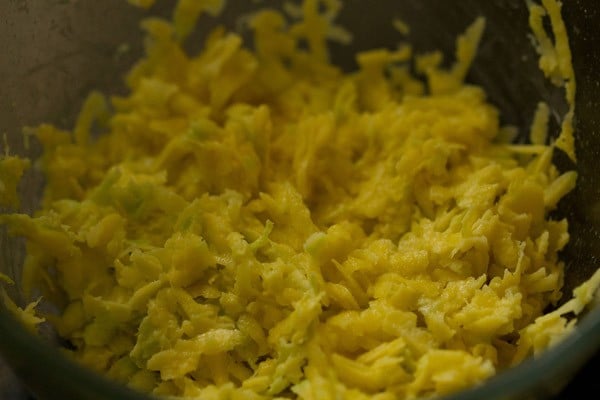
3. Powder 4 to 5 green cardamoms and 1 to 2 cloves in a mortar-pestle. Set aside. Discard the cardamom husks.
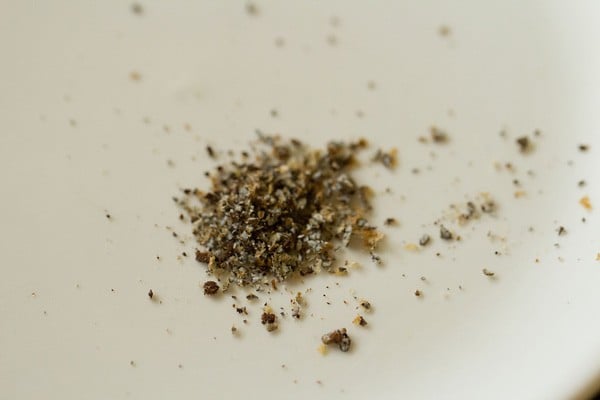
Making Aam Ka Murabba
4. In a pan, take the grated or shredded mangoes along with 1.5 cups sugar. The addition of sugar depends upon the sourness of the mangoes and your taste.
I added 1.5 cups of sugar. You can also add jaggery powder instead of sugar. I used raw sugar. Jaggery will obviously be a healthier option.
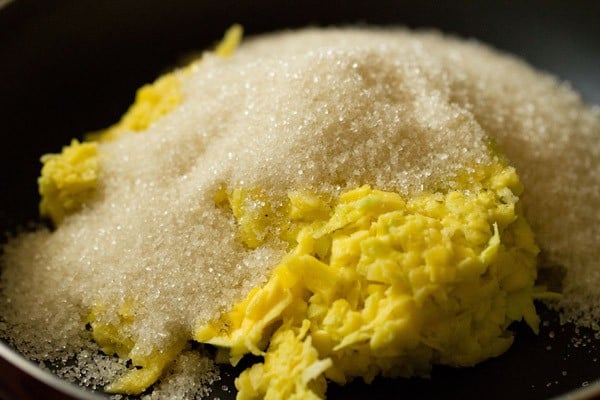
5. Switch on the heat. Stir the mango-sugar mixture very well.
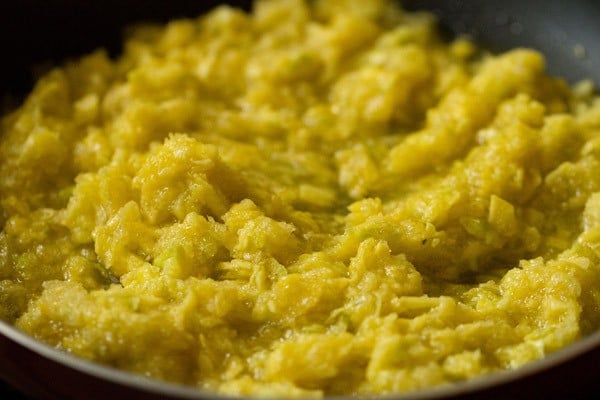
6. On low heat or sim, cook the mango mixture. Initially, the sugar will melt and consistency will be watery.
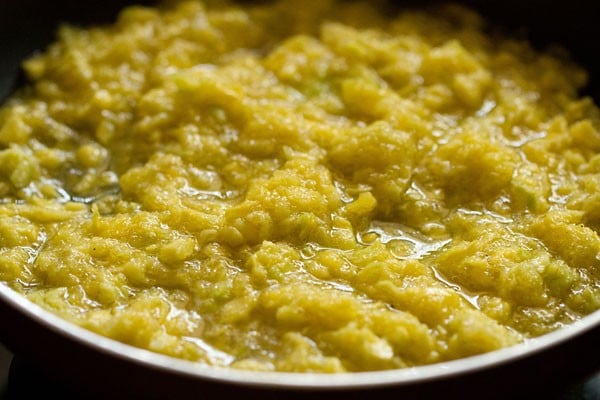
7. Stir often so that the sugar does not crystallize and keep on simmering the mixture.
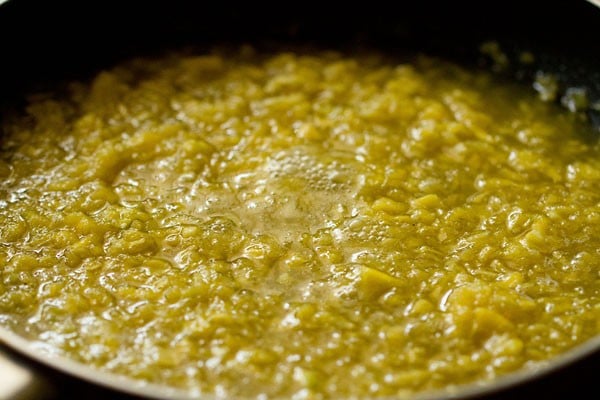
8. When the sugar syrup starts to cook, you will see the mixture bubbling.
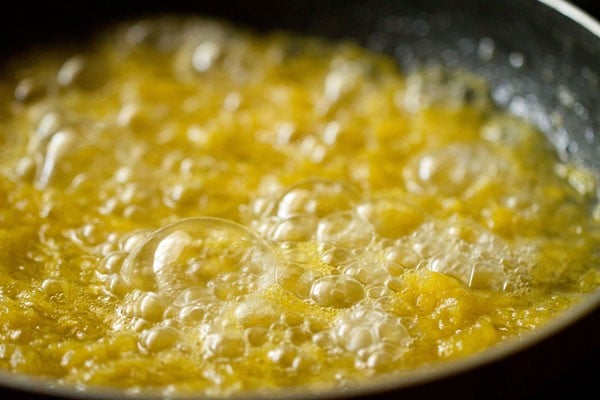
9. Keep on stirring and cooking.
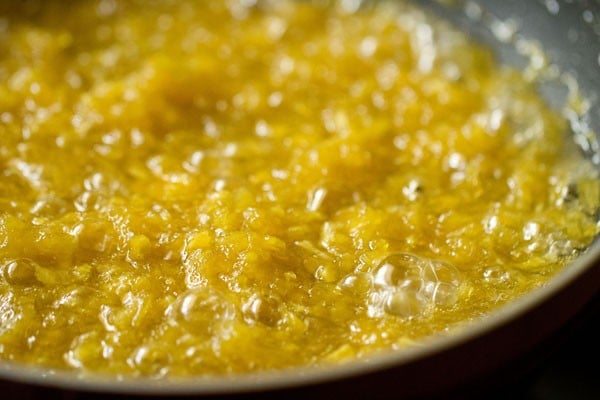
10. The mixture will begin to thicken.
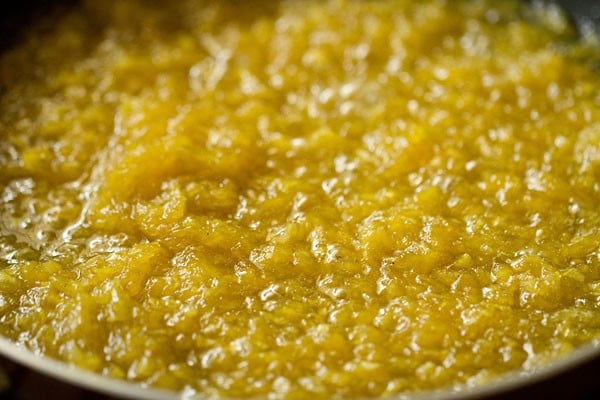
11. When the sugar in the mixture reaches 2 thread consistency, switch off the heat. If you cook more, then murabba gets a thick, sticky and hard consistency.
You can also choose to cook till 1 string consistency. The consistency should be jam-like and look translucent. There should also be a slight crunch in the mangoes.
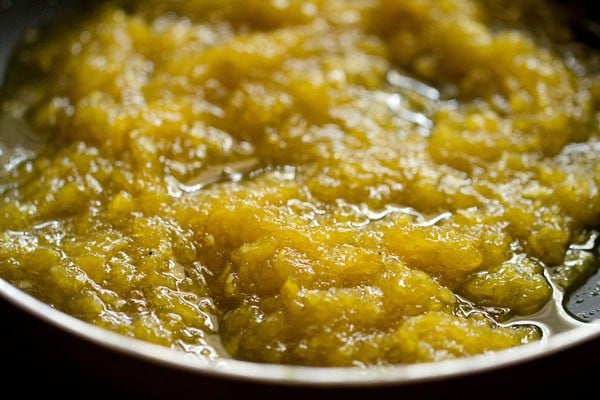
12. Add the powdered cardamom and cloves mixture and a few strands of saffron (crushed). On cooling, the consistency thickens more.
Omit the saffron if you do not have it.
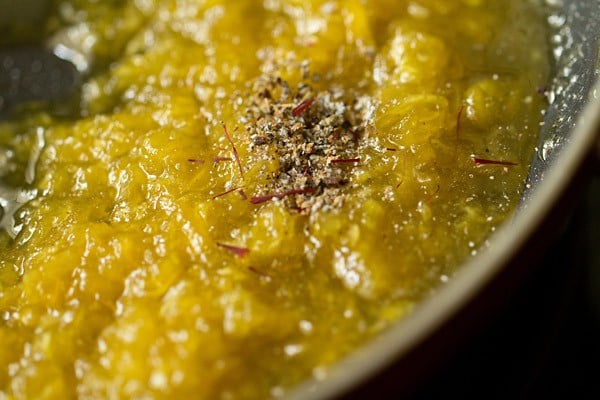
13. Mix very well and cool the mixture completely.
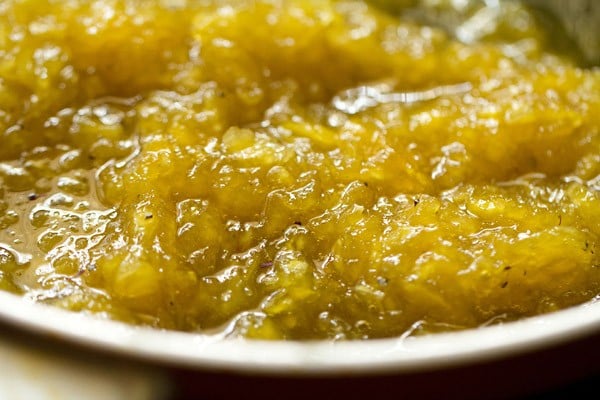
14. Once cooled, spoon Aam Ka Murabba in a clean sterilized glass jar or bottle. Stays good for more than 3 months in the refrigerator and about 15 to 20 days at room temperature.
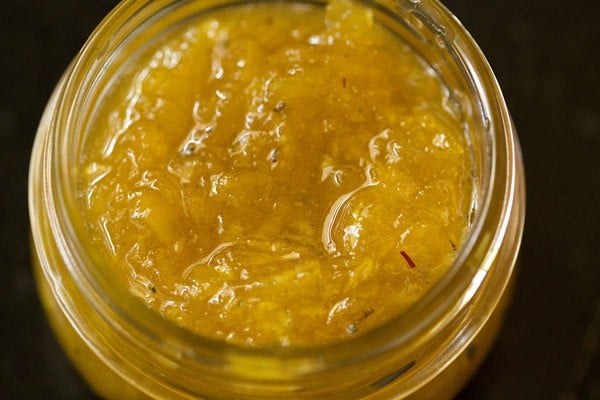
15. Serve Aam Ka Murabba as a side condiment with a North Indian meal or you can also have it with paratha or roti.
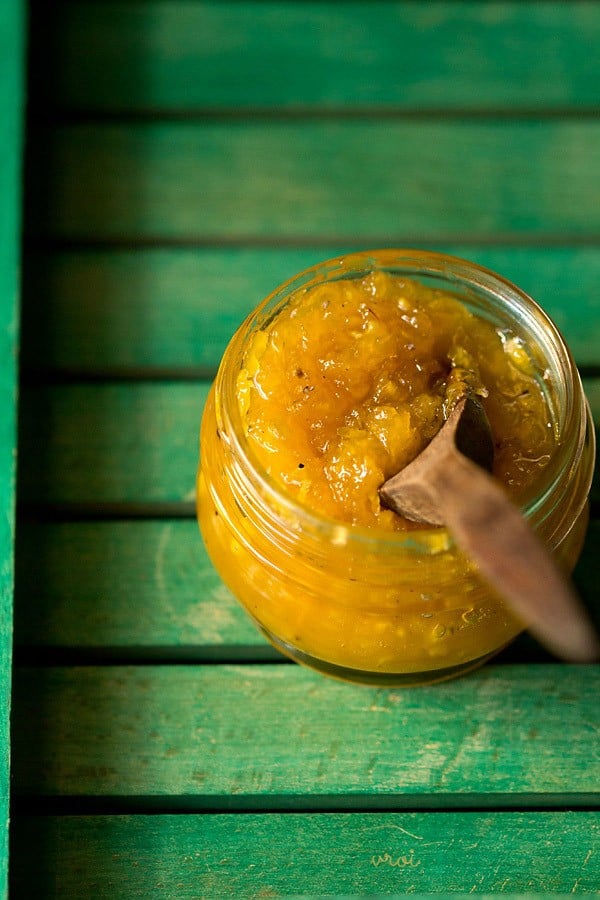
Murabba, Achar & Chutney
The terms murabba, achar and chutney might be a little confusing, and sometimes interchangeable too. This is mainly because of the commercial labels that tend to use one in place of the other, most of the times.
However, culinarily, all these three are distinct terminologies. The only common thing about these three is that all of them are methods of preserving fruits and vegetables.
Murabba
Since this post is dedicated to a murabba, I’ll begin with it. As already mentioned here earlier, a murabba is typically a preserve. The base is primarily a fruit or berry. The method is simple – chopped, grated or shredded fruits are cooked with sugar or kept in the sun, to get a consistency resembling jam. Additional flavors like saffron, cardamom or other spices can be used.
A similar variant to the Aam Ka Murabba is the extremely popular Aam Chunda, a special from Gujarati cuisine. The difference is that the chunda is spiced with the red chili powder and the murabba is not. Usually, I end up preparing both simultaneously.
Achar
An achar or Pickle is typically both veggies and fruits, which are mixed with salt and spices, drowned in oil and sun-dried to mature, or cooked. Pickling can also be done in brine (solution of salt and water) or vinegar solution. In addition to the Punjabi style Mango Pickle, I have this Lemon Pickle and Amla Pickle, which are absolute favorites.
Chutney
A Chutney typically can be considered as a relish or spread. It can be made with fruits, vegetables, herbs, nuts, curd, etc. and may be wet or dry. The wet chutneys may or may not be tempered and the dry chutneys can be prepared fresh with every meal. This Bengali style sweet and sour Mango Chutney is for keeps.
More Green Raw Mango Recipes To Try!
Rice Recipes
Pickle Recipes
Chutney Recipes
Please be sure to rate the recipe in the recipe card or leave a comment below if you have made it. For more vegetarian inspirations, Sign Up for my emails or follow me on Instagram, Youtube, Facebook, Pinterest or Twitter.
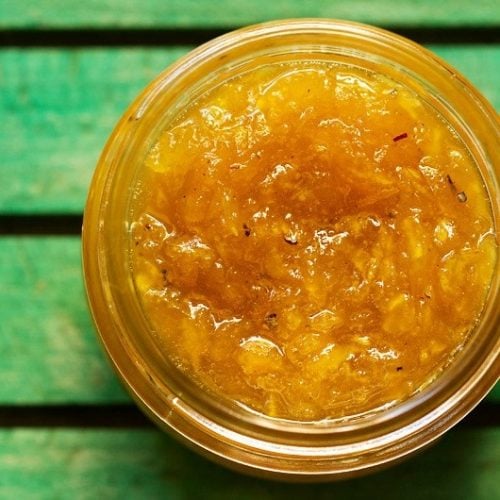
Aam Ka Murabba | Mango Murabba | Indian Mango Preserve
Ingredients
- 2 mangoes unripe, green and large – 400 grams or 250 grams grated or shredded mangoes or 1.25 cups tightly packed grated mangoes
- 1.5 cups raw sugar – 300 to 350 grams, can use white sugar or jaggery, add as required
- 4 to 5 green cardamoms – crushed finely in a mortar-pestle
- 1 to 2 cloves – crushed finely in a mortar-pestle
- 12 to 15 saffron strands – crushed, optional
Instructions
Preparation
- Rinse and wipe dry the mangoes. Then, peel them.
- Grate or shred the mangoes.
- Powder cardamoms and cloves in a mortar-pestle. Keep aside.
Making aam ka murabba
- In a pan, take the grated or shredded mangoes and sugar. Addition of sugar depends upon the tartness of the mangoes and your taste.
- Switch on the heat. Stir the mango-sugar mixture very well.
- On low heat, cook the mango-sugar mixture. Initially the sugar will melt and consistency will be watery.
- Stir often so that the sugar does not crystallize and keep on simmering the mixture.
- Keep on stirring and cooking till you get a 2 thread consistency. Turn off the heat. If you cook more then the murabba gets a thick, sticky and hard consistency.You can also cook until you get a 1 string consistency.
- Add the powdered cardamom and clove mixture and saffron (crushed). Mix very well.
- Cool it completely and then spoon in a clean sterilized glass jar or bottle.
- Serve Aam Ka Murabba or Mango Murabba as a side condiment with a North Indian meal or with roti or paratha.
Notes
- To get the authentic taste of aam ka murabba, use unripe green and firm mangoes. The mangoes should be sour or tart.
- You can omit adding any of the spices if you like or add your choice of spices.
- Cook the mango and sugar mixture on a low heat stirring at intervals until it reaches 1 to 2 string consistency. More than 2 thread consistency will make the mango murabba chewy or dense.
- Note that the approximate nutrition info is for about 1 tablespoon of aam ka murabba.
Nutrition Info (Approximate Values)
This Aam ka Murabba recipe post from the archives first published in June 2015 has been updated and republished on April 2023.
